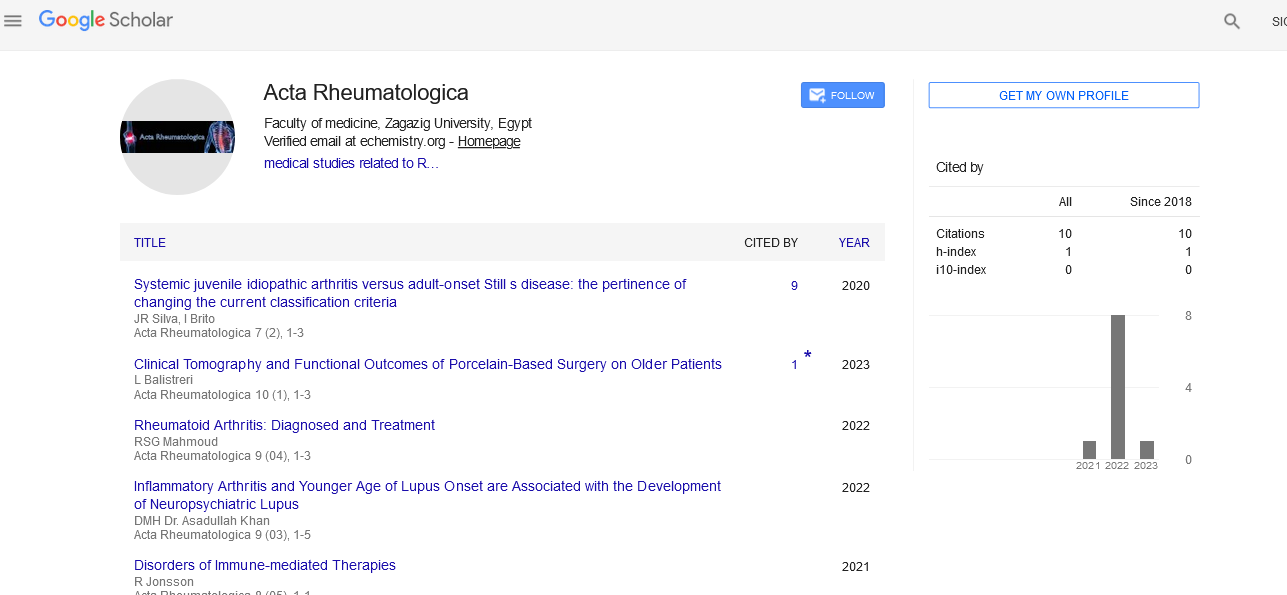Perspective - (2025) Volume 12, Issue 1
Anti-CCP Antibodies: A Key Biomarker in Rheumatoid Arthritis Diagnosis and Prognosis
Kei Sakata*
Department of Rheumatology, University of Miyazaki, Miyazaki City, Japan
*Correspondence:
Kei Sakata, Department of Rheumatology, University of Miyazaki, Miyazaki City,
Japan,
Email:
Received: 12-Feb-2025, Manuscript No. IPAR-25-15558;
Editor assigned: 17-Feb-2025, Pre QC No. IPAR-25-15558 (PQ);
Reviewed: 03-Mar-2025, QC No. IPAR-25-15558;
Revised: 11-Mar-2025, Manuscript No. IPAR-25-15558 (R);
Published:
19-Mar-2025
Introduction
Anti-Cyclic Citrullinated Peptide (Anti-CCP) antibodies are
autoantibodies that target citrullinated proteins, playing a
crucial role in the diagnosis and prognosis of Rheumatoid
Arthritis (RA). These antibodies have gained significant attention
in rheumatology due to their high specificity for RA and their
predictive value in disease progression. Understanding the role
of anti-CCP antibodies helps in early diagnosis, better treatment
strategies, and improved patient outcomes.
Description
What are anti-CCP antibodies?
Anti-CCP antibodies are immune proteins that mistakenly
attack the body's own citrullinated proteins. Citrullination is a
normal post-translational modification of proteins, but in
individuals with RA, this process triggers an abnormal immune
response, leading to chronic inflammation and joint destruction.
The presence of anti-CCP antibodies is highly indicative of RA,
distinguishing it from other autoimmune and inflammatory
conditions. These antibodies are detected through a blood test
and are often measured alongside Rheumatoid Factor (RF) to
improve diagnostic accuracy.
The role of anti-CCP antibodies in rheumatoid
arthritis
Anti-CCP antibodies contribute to RA pathogenesis in several
ways:
Early immune activation: Anti-CCP antibodies appear in the
bloodstream years before the onset of RA symptoms, making
them valuable for early diagnosis.
Joint damage and inflammation: These antibodies contribute
to joint inflammation and destruction by promoting the
production of inflammatory cytokines and recruiting immune
cells.
Disease severity prediction: Higher levels of anti-CCP
antibodies are associated with more aggressive disease
progression and joint damage.
Clinical significance of anti-CCP antibodies
Diagnostic utility
Anti-CCP antibodies have revolutionized RA diagnosis due to
their:
High specificity (95-98%): They are rarely found in conditions
other than RA.
Moderate sensitivity (60-80%): Not all RA patients test
positive, but those who do are more likely to have severe
disease.
Combination with RF: The presence of both RF and anti-CCP
significantly increases diagnostic confidence.
Prognostic value
Predicting RA development: Individuals with positive anti-
CCP but no symptoms are at higher risk of developing RA in the
future.
Disease severity and joint damage: Higher anti-CCP levels
correlate with increased joint erosion and disability.
Response to treatment: Patients with anti-CCP positivity may
have different responses to Disease-Modifying Antirheumatic
Drugs (DMARDs) and biologic therapies.
Anti-CCP vs. Rheumatoid Factor (RF)
While Rheumatoid Factor (RF) has traditionally been used in
RA diagnosis, it has limitations:
Lower specificity: RF is found in other autoimmune diseases
and chronic infections.
Lower predictive value: Unlike anti-CCP, RF does not appear
before RA symptoms and is less correlated with disease severity.
Thus, anti-CCP has largely replaced RF as the preferred biomarker
for early and accurate RA diagnosis.
Pathogenesis of RA and the role of citrullination
Citrullination is a process in which arginine residues in
proteins are converted into citrulline by Peptidyl Arginine
Deiminases (PADs). In RA, excessive citrullination leads to the production of anti-CCP antibodies, which contribute to immune
system dysfunction and chronic joint inflammation.
Common citrullinated proteins targeted in RA include:
• Fibrinogen
• Vimentin
• Type II collagen
• Enolase
Testing for anti-CCP antibodies
The anti-CCP test is a simple blood test that detects the
presence and concentration of these antibodies. It is used in:
• Early detection of RA.
• Differentiating RA from other joint diseases.
• Assessing disease severity.
• Monitoring disease progression.
Anti-CCP antibodies in other diseases
Although primarily associated with RA, anti-CCP antibodies
have also been detected in:
• Psoriatic arthritis (though at lower prevalence)
• Sjögren's syndrome
• Systemic Lupus Erythematosus (SLE)
• Tuberculosis (rare cases)
However, their presence in these conditions is much less
frequent, reinforcing their diagnostic utility in RA.
Treatment implications for anti-CCP positive patients
Anti-CCP positivity influences treatment decisions in RA:
Early and aggressive therapy: High anti-CCP levels indicate a
need for early DMARD intervention to prevent joint damage.
Targeted therapies: Biologic drugs such as Tumor Necrosis
Factor (TNF) inhibitors and Janus Kinase (JAK) inhibitors may be
more effective in anti-CCP positive patients.
Regular monitoring: Patients with anti-CCP positivity require
close follow-up to assess disease progression and treatment
response.
Future research and developments
Advancements in RA research are focusing on:
Personalized medicine: Using anti-CCP levels and other
biomarkers to tailor treatment strategies.
New therapeutic targets: Developing drugs that block
citrullination pathways.
Prevention strategies: Identifying at-risk individuals before RA
symptoms appear and intervening early.
Conclusion
Anti-CCP antibodies play a critical role in the diagnosis,
prognosis, and management of rheumatoid arthritis. Their high
specificity and predictive value make them a superior biomarker
compared to traditional tests like rheumatoid factor. By
identifying RA early and assessing disease severity, anti-CCP
testing enables timely and effective treatment, ultimately
improving patient outcomes. As research advances, the role of
anti-CCP antibodies in autoimmune diseases will continue to
expand, offering new possibilities for early intervention and
personalized medicine.





